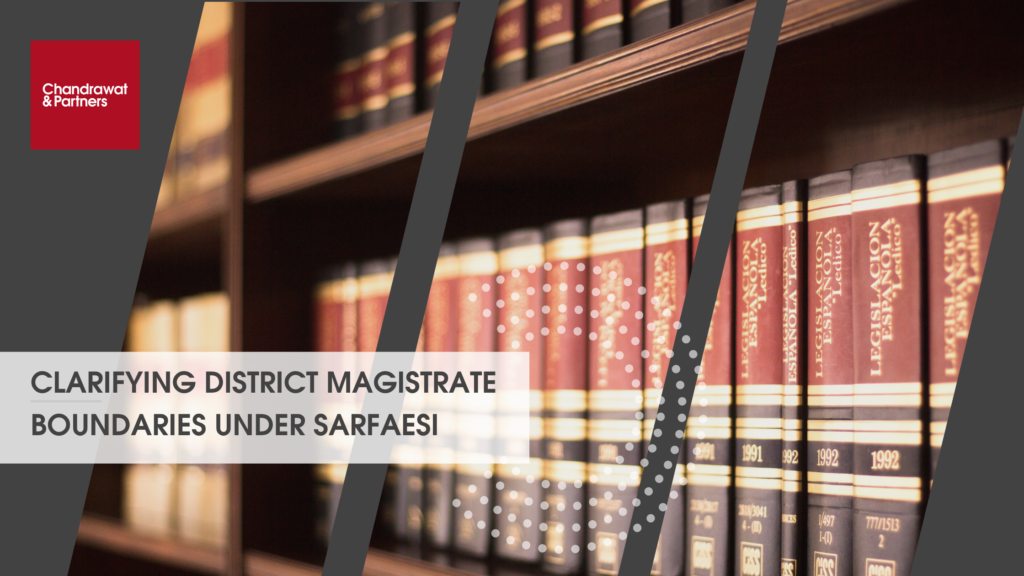Home > Recent judgements > Clarifying District Magistrate Boundaries Under Sarfaesi
April 26, 2024

Share :
CLARIFYING DISTRICT MAGISTRATE BOUNDARIES UNDER SARFAESI
The Punjab & Haryana High Court’s observation that “District Magistrates concerned are repeatedly breaching the mandate of law” serves as a wake-up call, underscoring the need for a clear understanding of their duties under Section 14 of the Securitisation and Reconstruction of Financial Assets and Enforcement of Security Interest Act, 2002 (“the Act”). This section empowers District Magistrates to assist secured creditors in taking possession of secured assets, but it does not grant them the authority to adjudicate on the merits of applications filed by creditors.
ADJUDICATION VS. EXECUTION
The SARFAESI Act serves a vital purpose in the financial landscape. It streamlines the process for secured creditors, like banks, to recover their dues when borrowers default on loans. This Act aims to expedite debt recovery, fostering a healthy financial environment where credit can flow freely. Section 14 of this Act empowers District Magistrates to play a crucial role in assisting secured creditors in taking possession of secured assets. These assets are typically property offered as collateral for the loan.
The matter was of the District Magistrate’s dismissal of the State Bank of India’s application under Section 14, citing non-compliance with statutory requirements under Section 13(3A) of the Act. However, the High Court clarified that the District Magistrate’s role is limited to executing the process, not adjudicating on the application’s validity.
STATUTORY REQUIREMENTS AND FINANCIAL DISCIPLINE
One of the key issues addressed by the court was the nature of the requirement under Section 13(3A) for secured creditors to respond to objections raised by debtors within 15 days. The court ruled that this provision is directory, not mandatory, in nature. The lending institution is not under a mandatory obligation to respond within 15 days, unless the delay causes demonstrable prejudice to the objector.
This ruling strikes a balance between protecting debtors’ interests and maintaining financial discipline. While acknowledging the importance of adhering to statutory requirements, the court recognized that minor deviations should not affect the creditor’s ability to recover secured assets, provided no grave prejudice is caused to the debtor.
HIGH COURT INTERVENTION FOR RESTORING ORDER AND CLARITY
By quashing the District Magistrate’s order rejecting the bank’s applications, the High Court has restored order and clarity to the interpretation of the Act. The judgment serves as a wake-up call for District Magistrates to uphold the law and respect the boundaries of their role as executing functionaries under Section 14 of the Act.
The High Court’s intervention safeguards the legal entitlements of both creditors and borrowers. Creditors can rely upon a more clear and straightforward interpretation of the Act, thereby ensuring a more predictable and expeditious debt recovery process.
UPHOLDING JUSTICE AND BOUNDARIES
The court’s directive to share the judgment with Magistrates exercising jurisdiction under Section 14 highlights the importance of addressing this issue. It is a reminder that adherence to the rule of law and separation of judicial powers are fundamental pillars of a strong legal system.
As legal practitioners and stakeholders in the financial sector navigates through the complexities of the Act, this judgment provides much-needed guidance. It reinforces the principle that statutory provisions should be interpreted in a manner that upholds the broader objectives of financial discipline and asset recovery, while safeguarding the rights of all parties involved.
In a landscape where the lines between judicial powers and executive functions can sometimes blur, this judgment serves as reminder that the effective administration of justice relies on a nuanced understanding of the roles and responsibilities assigned to different entities by the law.
For more information or queries, please email us at
[email protected]




